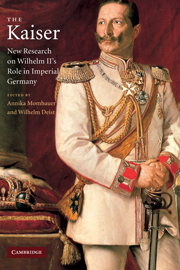Book contents
- Frontmatter
- Contents
- Notes on contributors
- Acknowledgements
- List of abbreviations
- Introduction
- Reflections on John Röhl: a Laudatio
- 1 Wilhelm II and ‘his’ navy, 1888–1918
- 2 Hollow-sounding jubilees: forms and effects of public self-display in Wilhelmine Germany
- 3 The Kaiser's elite? Wilhelm II and the Berlin administration, 1890–1914
- 4 Wilhelm, Waldersee, and the Boxer Rebellion
- 5 Dreams of a German Europe: Wilhelm II and the Treaty of Björkö of 1905
- 6 The uses of ‘friendship’. The ‘personal regime’ of Wilhelm II and Theodore Roosevelt, 1901–1909
- 7 Military diplomacy in a military monarchy? Wilhelm II's relations with the British service attachés in Berlin, 1903–1914
- 8 Wilhelm II as supreme warlord in the First World War
- 9 Germany's ‘last card’. Wilhelm II and the decision in favour of unrestricted submarine warfare in January 1917
- 10 Military culture, Wilhelm II, and the end of the monarchy in the First World War
- 11 Rathenau, Wilhelm II, and the perception of Wilhelminismus
- 12 Structure and agency in Wilhelmine Germany: the history of the German Empire – past, present, and future
- Index
4 - Wilhelm, Waldersee, and the Boxer Rebellion
Published online by Cambridge University Press: 24 July 2009
- Frontmatter
- Contents
- Notes on contributors
- Acknowledgements
- List of abbreviations
- Introduction
- Reflections on John Röhl: a Laudatio
- 1 Wilhelm II and ‘his’ navy, 1888–1918
- 2 Hollow-sounding jubilees: forms and effects of public self-display in Wilhelmine Germany
- 3 The Kaiser's elite? Wilhelm II and the Berlin administration, 1890–1914
- 4 Wilhelm, Waldersee, and the Boxer Rebellion
- 5 Dreams of a German Europe: Wilhelm II and the Treaty of Björkö of 1905
- 6 The uses of ‘friendship’. The ‘personal regime’ of Wilhelm II and Theodore Roosevelt, 1901–1909
- 7 Military diplomacy in a military monarchy? Wilhelm II's relations with the British service attachés in Berlin, 1903–1914
- 8 Wilhelm II as supreme warlord in the First World War
- 9 Germany's ‘last card’. Wilhelm II and the decision in favour of unrestricted submarine warfare in January 1917
- 10 Military culture, Wilhelm II, and the end of the monarchy in the First World War
- 11 Rathenau, Wilhelm II, and the perception of Wilhelminismus
- 12 Structure and agency in Wilhelmine Germany: the history of the German Empire – past, present, and future
- Index
Summary
His Majesty [Kaiser Wilhelm II] remarked further that in the near future decisions would be made not by diplomacy, but by the sword.
In the spring and summer of 1900, the colonial powers in China experienced a violent backlash against their ‘civilizing’ and missionary undertakings in the country. In an effort to defend their interests against Chinese resistance during the so-called Boxer Rebellion, the war against the ‘Boxers’ marked one of the first occasions of international co-operation in the face of a perceived common enemy. However, the unity between the Great Powers produced by the shared goal of defending the principles of the Occident against the Orient did not last much longer than the initial outrage with which the horrific violence of the revolt was received. The hope of future co-operation closer to home proved unfounded. None of the governments involved really trusted the others, or played a straightforward game, and Germany under Wilhelm II's leadership was no exception.
In the war against the Chinese, as so often on other occasions during Wilhelm's reign, for Germany, and for Wilhelm, there was more at stake than avenging the horrors inflicted upon scores of foreign victims, or the assassination of the German envoy in Peking, or even of staking a claim in China. Rather, Wilhelm wanted to demonstrate to the world that Germany was a power to be reckoned with, and he wanted to be seen to be playing an important role in international affairs.
- Type
- Chapter
- Information
- The KaiserNew Research on Wilhelm II's Role in Imperial Germany, pp. 91 - 118Publisher: Cambridge University PressPrint publication year: 2003
- 2
- Cited by

